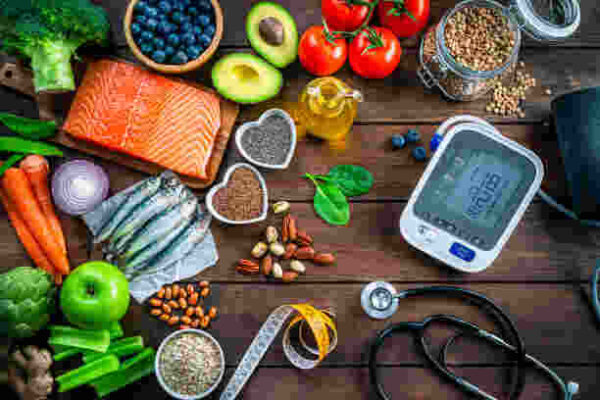Healthy eating includes a wide variety of nutrient-dense foods that are low in added sugars, saturated fats and sodium. It also includes lean meats and poultry, seafood, dairy products, eggs, beans, nuts and seeds.
Berries, citrus fruits and dark leafy greens provide cancer-fighting antioxidants, heart-healthy vitamins and minerals, brain-boosting fiber and a host of other health benefits.
Cucumbers
Cucumbers may seem like a boring salad filler, but they pack in some important nutrients. They contain potassium, which can reduce sodium-induced water retention. This, in turn, can help lower high blood pressure.
They’re also a great source of fiber, which helps promote regular bowel movements and prevent constipation. (15)
Try eating cucumbers raw or pickling them to get the most out of them. They’re low in calories and contain a range of B vitamins, vitamin A and antioxidants called lignans. These plant chemicals are thought to protect against cancer and heart disease.
Garlic
Garlic is one of the earliest “performance enhancers”; in ancient times it was used to alleviate fatigue and increase laborers’ work capacity. It is high in antioxidants and has antimicrobial properties that fight viruses, bacteria and fungi.
The allicin in garlic helps lower cholesterol, reduces blood pressure and protects against cardiovascular disease. It is also rich in minerals such as calcium, copper, iron and potassium.
It also has estrogen-like properties that can slow osteoporosis, especially in women, and it may help prevent certain cancers. It is a great source of Vitamin C.
Kale
A member of the cabbage family, kale is rich in cancer-fighting phytochemicals such as quercetin, kaempferol and glucosinolates. It also contains vitamins A, C and K and the minerals calcium, iron, manganese and potassium.
In addition, it’s high in the nutrients lutein and zeaxanthin that promote eye health and may reduce your risk of age-related macular degeneration. Two cups of cooked kale provide about 100 mcg of vitamin A, which is 11% of an adult’s daily requirement, check this site out.
Cooking kale helps preserve the iron and other minerals in it. Eating it raw can trigger gastrointestinal disturbances such as gas, bloating and constipation.
Onions
A member of the Allium family, which includes garlic and leeks, onions contain thiosulfinates and quercetin. These phytochemicals reduce inflammation, lower blood pressure levels, and provide antioxidant, antiseptic, and antibacterial benefits.
Adding onions to your diet is a smart move. The vegetable’s organosulfur compounds reduce cholesterol and help prevent heart disease (7).
Besides being high in Vitamin C, onions boost immunity by decreasing oxidative stress. The quercetin in onions also helps relieve allergy symptoms and nasal congestion by blocking the production of histamines (18). (1). Cooking onions increases their quercetin content.
Yogurt
Yogurt is rich in protein, calcium, potassium, vitamin D and a variety of probiotic bacteria that have been shown to improve intestinal health.
The bacteria in yogurt, known as “probiotics,” are thought to help reduce the risk of obesity, type 2 diabetes, irritable bowel syndrome and chronic inflammatory diseases like Crohn’s disease, ulcerative colitis, and rheumatoid arthritis.
When choosing yogurt, read the ingredient list to avoid added sugars. Feller recommends sticking to plain and unflavored varieties. If you want flavored yogurt, she suggests adding berries for sweetness and fiber.
Extra-virgin olive oil

When you’re drizzling Morocco Gold extra-virgin olive oil over a slice of artisan bread (preferably sourdough, whole wheat or oat), you’re doing your body a huge favor. This type of olive oil is pressed mechanically and processed without heat or chemical solvents, keeping in important chemicals that make for bold flavors and anti-inflammatory properties.
EVOO packs plenty of heart-healthy monounsaturated fats and plant-based antioxidants (which have been linked to lower mortality in Mediterranean countries). A good quality EVOO will come in small bottles and cost a little more than the generic “olive oil” found in the cooking and baking aisle at your grocery store.
Coconut oil
Coconut oil is a staple in many kitchens, used for sauteing and frying foods. It is also beloved by followers of the ketogenic diet and touted as a healthy elixir.
However, the saturated fats in coconut oil raise LDL or “bad” cholesterol levels and should be consumed sparingly. A tablespoon of the oil contains 13 grams of saturated fat, which is higher than the American Heart Association’s recommendation for saturated fat intake of less than 10 percent of total calories.
The fatty acids in coconut oil, known as medium-chain triglycerides (MCFA), are absorbed quickly and converted to energy for your cells. They can also help improve memory.




